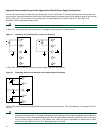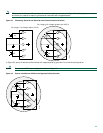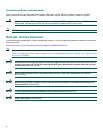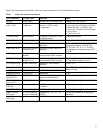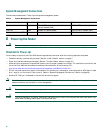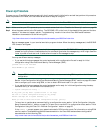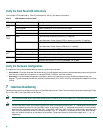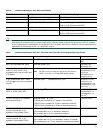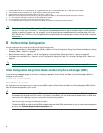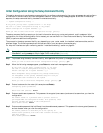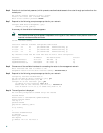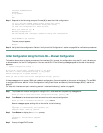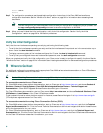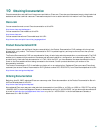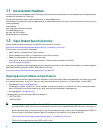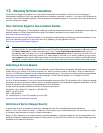
32
Note On the Cisco 2811, Cisco 2821, and Cisco 2851 routers, the interface numbering scheme is the same for asynchronous
interfaces as other types of interfaces. To configure the line associated with an async interface, simply use the interface
number to specify the async line. For example, line 0/3/0 specifies the line associated with interface serial 0/3/0 on a
WIC-2A/S in slot 3. Similarly, line 1/22 specifies the line associated with interface async 1/22 on an NM-32A in network
module slot 1.
8 Perform Initial Configuration
You can configure your router by using one of the following tools:
• Cisco Router and Security Device Manager (SDM)—See the “Initial Configuration Using Cisco Router and Security Device
Manager (SDM)” section on page 32.
• Setup command facility—See the “Initial Configuration Using the Setup Command Facility” section on page 33.
• Command-line interface (CLI)—See the “Initial Configuration Using the Cisco CLI—Manual Configuration” section on
page 35.
Note If you need help with the interface and port numbering, see the “Interface Numbering” section on page 30.
Initial Configuration Using Cisco Router and Security Device Manager (SDM)
If the following messages appear at the end of the startup sequence, Cisco Router and Security Device Manager (SDM) is
installed on your router:
yourname con0 is now available
Press RETURN to get started.
For instructions on configuring your router by using SDM, see the Cisco Router and Security Device Manager (SDM) Quick
Start Guide that shipped with your router.
Tip If the messages above do not appear, SDM and the Cisco Router and Security Device Manager (SDM) Quick Start
Guide were not shipped with your router. If you want to use SDM, you can download the latest version of SDM and
instructions for installing it on your router from the following location:
http://www.cisco.com/pcgi-bin/tablebuild.pl/sdm
To obtain the SDM quick start guide, SDM release notes, and other SDM documentation, go to www.cisco.com/go/sdm
and click the Technical Support and Documentation link.
1. Interface abbreviations: fa = Fast Ethernet; gi = Gigabit Ethernet; usb = Universal Serial Bus; bri = ISDN basic rate interface.
2. The interfaces listed are examples only; other possible interface types are not listed.
3. Interface card slot numbers for double (HWIC-D) slots are 1 and 3 only.
4. Specify the line number in the Cisco IOS CLI by using the interface number for the associated asynchronous serial interface.
5. “1” is the network module slot number in all Cisco 2800 series routers.
6. “2” is the EVM slot number in Cisco 2821 and Cisco 2851 routers.
7. “0” is required by the CLI syntax for voice ports in an EVM; it indicates no interface card slots in EVMs.



